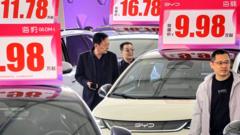
The Electric Vehicle Juggernaut: A Look at the World's Leading EV Market
Dominance in Production and Consumption
The global electric vehicle (EV) market is undergoing a period of unprecedented growth, and at the heart of this revolution lies the world's second-largest economy. This nation stands as both the largest producer and consumer of electric vehicles, solidifying its position as a key player in shaping the future of transportation.
This dual role as both a manufacturing powerhouse and a significant consumer market creates a powerful feedback loop, driving innovation, reducing costs, and accelerating the adoption of EVs on a global scale. The implications of this dominance are far-reaching, impacting everything from energy policy to environmental sustainability and global trade.
Production Prowess: Manufacturing on a Massive Scale
The nation's rise as the top EV producer is a testament to strategic government policies, substantial investments in research and development, and the establishment of a robust supply chain. Major domestic automakers, along with collaborations with international companies, have spurred the development of a wide range of electric vehicle models, catering to diverse consumer needs and preferences.
Key factors contributing to this manufacturing success include:
- Government Incentives: Subsidies, tax breaks, and other financial incentives have encouraged both manufacturers and consumers to embrace EVs.
- Infrastructure Development: Significant investments in charging infrastructure have alleviated range anxiety and made EV ownership more practical.
- Raw Material Access: Control over key raw materials, such as lithium and cobalt, essential for battery production, provides a competitive advantage.
- Technological Advancement: Continuous innovation in battery technology, motor efficiency, and vehicle design has resulted in increasingly competitive EV offerings.
A Booming Domestic Market: Driving Demand
The sheer size of the domestic market is a critical factor in driving the demand for EVs. A growing middle class, increasing urbanization, and a heightened awareness of environmental issues have all contributed to the surge in EV sales. Government regulations aimed at reducing air pollution in major cities have further incentivized the switch to electric vehicles.
The factors fueling domestic EV consumption include:
- Stringent Emission Standards: Regulations on vehicle emissions in major cities are pushing consumers towards cleaner transportation alternatives.
- Purchase Subsidies: Direct financial incentives for purchasing EVs reduce the upfront cost, making them more accessible to a wider range of consumers.
- Limited License Plate Restrictions: Some cities offer exemptions from license plate restrictions for EVs, granting them greater freedom of movement.
- Growing Charging Infrastructure: The expanding network of public charging stations makes EV ownership more convenient and reduces range anxiety.
Global Implications: Reshaping the Automotive Industry
The dominance of this nation in the EV market has profound implications for the global automotive industry. Traditional automakers are facing increasing pressure to adapt to the electric vehicle revolution, and many are investing heavily in developing their own EV platforms and technologies.
Moreover, the rise of Chinese EV brands is challenging the established dominance of European, American, and Japanese automakers. These Chinese companies are increasingly exporting their EVs to other markets, further intensifying competition and driving down prices.
Looking Ahead: Continued Growth and Innovation
The future of the EV market looks bright, with continued growth and innovation expected in the coming years. As battery technology improves, charging infrastructure expands, and consumer awareness increases, EVs are poised to become an increasingly dominant force in the transportation sector. The nation leading this charge is expected to maintain its position as a key driver of this global transformation, shaping the future of mobility for decades to come.
Challenges and Opportunities
Despite its current dominance, challenges remain. Ensuring a sustainable supply of raw materials, managing the environmental impact of battery production and disposal, and addressing cybersecurity concerns related to connected vehicles are all critical issues that need to be addressed.
However, these challenges also present significant opportunities. Investing in battery recycling technologies, developing more sustainable mining practices, and strengthening cybersecurity protocols will be crucial for ensuring the long-term success of the EV industry and solidifying its role in a cleaner, more sustainable future.
```